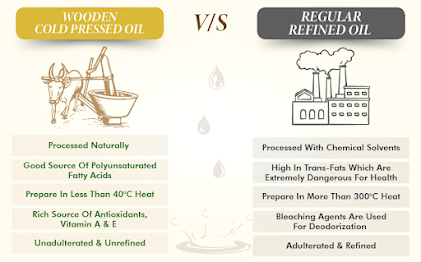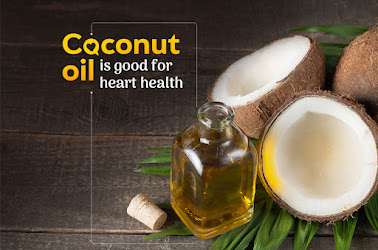COCONUT OIL:
Coconut oil is a popular oil that is extracted from the meat of mature coconuts. It is used in cooking, baking, and as a beauty product. The oil is high in saturated fats, which can make it a controversial food item. However, it is also rich in medium-chain triglycerides (MCTs), which are a type of fat that is easily metabolized by the body and may have health benefits. Some people also use coconut oil for skin care, hair care and for oil pulling.DAISY WOOD PRESSED COCONUT OIL:
Wood-pressed coconut oil is a type of coconut oil that is made using a traditional method of extracting oil from coconut meat. The process typically involves using a wooden press, such as a manual or hydraulic press, to extract the oil from the coconut meat. This method is considered to be more natural and preserves the nutritional value of the oil.  Wood-pressed coconut oil is also known for its distinct aroma and flavor, which is often described as nutty and earthy. Unlike the ordinary coconut oil which is extracted by using high heat and chemicals, this method is considered to be more healthier because it preserves the natural nutrients present in the oil.
Wood-pressed coconut oil is also known for its distinct aroma and flavor, which is often described as nutty and earthy. Unlike the ordinary coconut oil which is extracted by using high heat and chemicals, this method is considered to be more healthier because it preserves the natural nutrients present in the oil.
WHICH COCONUT OIL IS BETTER FOR HEALTH?
Both wood-pressed and processed coconut oil can be healthy options, depending on how they are produced and used.
Wood-pressed coconut oil is considered to be a more natural and healthier option because it is made using a traditional method that does not involve high heat or chemicals. This method preserves the natural nutrients present in the oil, such as medium-chain triglycerides (MCTs) and lauric acid. These nutrients may have health benefits, such as improving metabolism and supporting heart health.
Processed coconut oil, on the other hand, is made using a more industrial method that involves high heat and chemicals to extract the oil from the coconut meat. This method can strip the oil of some of its natural nutrients and can also introduce impurities. However, if the processing method is done correctly and the oil is refined, deodorized and bleached properly it can be a healthy option as well.
It's important to note that the quality of coconut oil can vary depending on the source, so it's always a good idea to check the label and look for high-quality, unrefined and organic coconut oil.
MEDICAL BENEFITS OF COCONUT OIL:

Coconut oil is high in saturated fats, mostly in the form of medium-chain triglycerides (MCTs), which can have some potential health benefits.
Weight loss: MCTs present in coconut oil can increase energy expenditure and boost metabolism, which can aid in weight loss.
Heart health: Coconut oil may help to improve cholesterol levels by raising levels of good cholesterol (HDL) and reducing levels of bad cholesterol (LDL).
Brain health: MCTs in coconut oil can be used as an energy source for the brain and may help to improve cognitive function.
Skin health: Coconut oil is a popular ingredient in skin care products because it can help to moisturize and protect the skin. Its anti-inflammatory properties can also help to soothe irritated skin.
Hair health: Coconut oil can be used as a natural conditioner to help improve the health and appearance of hair.
Dental health: Coconut oil is used in oil pulling and can help to reduce plaque, gingivitis, bad breath, and tooth decay.
It's important to note that more research is needed to fully understand the potential health benefits of coconut oil and to determine appropriate dosage and use. It's also important to keep in mind that coconut oil is high in saturated fats, and consuming too much can increase the risk of heart disease. Therefore it's important to consume it in moderation and as part of a balanced diet.
TO PURCHASE:
CONTACT NUMBER: +91 98408 00182
ADDRESS:
DAISY HOSPITAL,
NO 3, RANGASAMY STREET,
KOTHANDAM NAGAR,
CHROMPET,
CHENNAI-44.


 Wood-pressed coconut oil is also known for its distinct aroma and flavor, which is often described as nutty and earthy. Unlike the ordinary coconut oil which is extracted by using high heat and chemicals, this method is considered to be more healthier because it preserves the natural nutrients present in the oil.
Wood-pressed coconut oil is also known for its distinct aroma and flavor, which is often described as nutty and earthy. Unlike the ordinary coconut oil which is extracted by using high heat and chemicals, this method is considered to be more healthier because it preserves the natural nutrients present in the oil.








Comments
Post a Comment